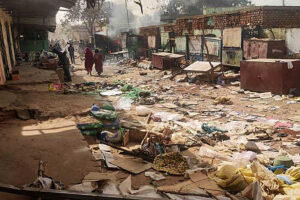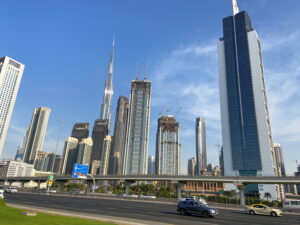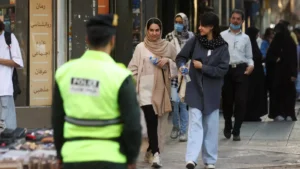
The National Interest Foundation Newsletter
Issue 200, July 28, 2023
Welcome to our NIF Newsletter. In this week’s headlines: we analyze a recent poll on America’s views on Zionism, investigate the growing atrocities in Darfur, look into the United Arab Emirates’ economic expansion, and explore the return of the morality police in Iran.
Written by Jacob Van Veldhuizen and Toni JeBailey
American Perception of Zionism

Netanyahu’s actions have jeopardized the nature of the relationship between the United States and Israel. (Photo from Reuters)
America’s Views on Zionism
A recent poll conducted by the University of Maryland Critical Issues Poll indicates a lack of support for Israel’s current policies among the American public. When asked whether they favor Israel’s democracy or Jewishness more, 73% of respondents favored democracy. When viewed in context with the current events in Israel, this points to clear disapproval of the recent actions of the extreme far-right Israeli government. When asked about their impression of Zionism, only 8% of the respondents had favorable views. When excluding the answers “Unfamiliar” or “I don’t know”, more respondents, 30%, had negative impressions, while 21% had positive ones. A majority of those with negative views of Zionism identified as Democrats. This is the first time these questions were used in this poll, so it is not yet possible to identify any changes in perception over time.
Israel is currently facing a historic governmentalcrisis. The extremist far-right government led by Prime Minister Benjamin Netanyahu recently passed a bill effectively dismantling Israel’s supreme court. The recently passed law will remove the court’s ability to review and strike down laws it deems unreasonable. The supreme court is one of the only checks left on the power of Israel’s legislative branch, the Knesset. The judicial branch is set to hear a petition against the new law in September. This sets the stage for a constitutional crisis that may send the country into chaos. The justices will need to choose between accepting Netanyahu’s law that reduces their power or striking the law down. In doing the latter, there is also the risk that the ruling coalition will simply refuse to abide by the ruling.
Likely, Netanyahu’s actions will harm Israel’s stance on the world stage. Netanyahu risks US support in the long term. A big selling point used by those supporting the relationship between the United States and Israel was the claim that Israel is the only democracy in the Middle East. Despite the original falsehood of this statement, it will become a much more difficult sell as checks against the ruling coalition are dismantled. A loss of American support will open Israel up to a wide variety of attacks, both diplomatic and militarily. The UN and other international organizations will be allowed to launch their investigations into Israeli human rights abuses against Palestinians unhampered by American obstruction.
It is also nearly certain that the violence in Palestine will continue to escalate. With the Supreme Court gutted Netanyahu’s government is free and clear to create new illegal settlements and expand existing ones. This will continue to force Palestinians into a corner. It is also likely that Israel will use increasingly violent and inhumane means to expand these settlements. This could send the entire country into a state of conflict that will lead to the deaths of many Israelis and Palestinians.
Netanyahu has personal motivations that seem to outweigh this risk. Currently, He is under investigation for corruption charges. By stripping the Supreme Court of its powers, Netanyahu ensures he will not be convicted. He also seems determined to maintain power by any means necessary, and this move will allow him to do what is necessary to maintain his coalition and his power.
The dismantling of democracy and lack of public support for Israel’s policies should affect the US policy towards Israel. So far, it has had little to no impact on the unconditional congressional support for Israel. Just 2 years ago, 325 members signed a letter in support of full funding of Security Assistance to Israel without any conditions. This is despite a majority of Americans supporting some type of conditionality.
It remains unlikely that there will be any major shift in US policy anytime soon. Despite the growing opposition to the policies of the extremist far-right Israeli government, the waters are still very muddied in the United States. It is important to note that in most of the questions about Israel and Zionism, a majority of the respondents replied, “I don’t know.” This indicates a lack of understanding or willingness to answer these questions. The discussion surrounding Israel and its policies is still extremely contentious and one many Americans often opt to avoid altogether. This lack of engagement, for whatever reason, continues to be a contributing factor in the maintenance of the status quo.
Atrocities in Sudan

The escalation of tribal violence in Darfur has already caused thousands of casualties and massive destruction. (Photo from AFP)
Will Action be Taken to Prevent Further Atrocities in Sudan?
As the conflict within Sudan passes the 100th-day milestone, fighting between the state army and the Rapid Support Forces (RSF) shows no indication of concluding. With mounting casualties and over 2.6 million people displaced by the war, estimations of aid necessary are upwards of $3 billion, with at least $2.6 billion for solely humanitarian efforts. Over 700,000 refugees have fled to the nearby countries of Ethiopia, Chad, Libya, and Egypt, placing strains on their economies and resources due to being unequipped to handle the refugee influx. As the state inches closer to complete disintegration, it is imperative to reflect on the nation’s history, the conflict itself, and the capabilities of international aid to shape conversations about the crisis moving forward holistically.
The conflict began on April 15th, as fighting and gunshots broke out in Khartoum, the state’s capital. Both Sudan and the RSF place initial instigating blame on the other, with fighting expanding to the western region of Darfur. While the event may appear unprovoked, upon further insight, the enabling of violence within Darfur can be connected to Sudan’s longtime ruler Omar al-Bashir, who was ousted in 2019. President Omar al-Bashir mobilized the Janjaweed, which later become RSF, in 2003 when attempting to suppress the rebellion within Darfur. The Janjaweed committed genocide against the non-Arab people of Darfur, committing numerous crimes against humanity. While the RSF participated in the coup that overthrew al-Bashir, the inclination for authoritarianism above all means has persisted as an ideology within the forces. In 2019, a joint military-civilian council was formed to integrate the Sudanese army and RSF, with the deal intended to be upheld for three years until the next election. Yet, as the RSF has resisted this integration and attacked various pro-democracy groups, this tension culminated in the April 15th attacks, launching Sudan into an intense period of war and violence.
This racially motivated violence in Darfur has flared up once again, as reports flow out of the region of the murder and brutalization of civilians by the RSF. This violence has continued to escalate with no sign of stopping, creating a risk of a repeat of the genocide in the 2000s. In 2003, the genocide was extensively reported on by the media. This enormous public attention enabled international policy responses, including a campaign to get justice for the targeted groups. Now, there is little to no mention of the conflict in Sudan in mainstream media. There is no public outrage as there was in 2003. This lack of attention and subsequent lack of action will only allow the RSF to further escalate its attack on the people of Darfur.
There is also little hope for an end to the war. With multiple international mediation offers presented, they have yet to end the conflict within Sudan successfully. Most recently, IGAD, an East African regional bloc, proposed Kenyan-led negotiations within Khartoum. The Sudanese army refused to participate, citing suspicions of RSF support from Kenyan President and proposed leader of the negotiations William Ruto. This proposal, like many, failed to be enacted due to state opposition or limitations in implementation, allowing an open avenue for violence to continue ensuing within Sudan. The United States and Saudi Arabia have pledged support in some aspects for peace negotiations yet have failed to coordinate with other international states and entities to implement these plans successfully. The Sudanese government has denied rumors of truce conversations in Saudi Arabia by Sudanese army officials. The continuing conflict makes it more difficult to deliver aid to those suffering in Sudan and the surrounding countries and gives the RSF a smokescreen to continue their genocide.
Regardless, the longer the conflict continues, the more Sudanese people will die. As the situation continues to deteriorate within the country continue, many flee the state. Sudan remains incredibly vulnerable as conflict and violence further exacerbate the conditions within Darfur, Khartoum, and the entire state. With no inclinations of international intervention at this current point, the global community is left to witness Sudan’s crisis further develop to a new extremity.
UAE’s Economic Expansion

Real estate has been a main driver of economic growth in the UAE. (Photo from Reuters)
The Effects of the United Arab Emirates Global Investment Expansion
As the Dubai Financial Market hit an eight-year peak, with the city-state’s stock market peaking at 4,022 points, this boom indicates the United Arab Emirates’ tremendous financial success. The recent achievements within the real estate industry, which account for 10% of Dubai’s gross domestic product, are cited as the source of recent stock highs. The continued upward trend of real estate sales indicates further success to come. The highest shares are in Emaar Properties and Emaar Development, responsible for many high-rise development projects across the Emirates. With most investors from Russia, which has risen since Russia invaded Ukraine last year, these real estate enterprises have mirrored the UAE’s similar economic expansions in other sectors.
As the UAE aims to divest its majority of the oil industry into other diverse sectors, immigration has been an unlikely avenue that has garnered investment. Most recently, Saudi Arabia and the United Arab Emirates met in Rome, Italy, at an international conference regarding the global migration crisis, with the UAE pledging $100 million to support development projects in the affected countries. This follows the state’s recent visa ban lifted for Lebanese nationals attempting to visit the country, with the initial limitation set due to security concerns. With the UAE making an active effort to involve themselves in the global migration crisis, particularly illegal migration from North Africa, Asia, and the Middle East into Europe, the investment into these endeavors coincides with both political interests and a desire to increase their impact and influence within the global community.
Similarly, the United Arab Emirates announced its commitment to meeting CO2 emission targets by 40% by 2030, as they are also set to host the COP28 climate summit later this year. This follows a recent deal with Japan to expand renewable energy technologies and energy security, showing a direct interest and investment in global environmental policies and commitments. In agreeance with the OPEC+ production cuts beginning earlier this month, UAE Energy Minister Suhail al-Mazrouei reaffirmed this decision as correct and stated that the UAE’s resources were accessible at “only a phone call away” if needed. An active effort to distance itself from the oil industry and output, combined with an interest in cleaner energy solutions and technologies, is another aspect of the larger-scale effort by the United Arab Emirates to cement its place as a robust global power within international diplomacy and decision-making.
Regarding diplomacy, the UAE has made various efforts to expand global partnerships and even diversify itself from other Gulf States. Recently, the UAE and Turkey signed a series of deals worth $50.7 billion, many of which were investments into Turkey’s infrastructure and earthquake relief efforts. In a similar domain, the United Arab Emirates has successfully restored many relationships with neighboring states, including Qatar and Iran. With many of these allyships pursuing an aspect of economic investment, the UAE aims to take a neutral role in contentious political disputes, focusing on investments in trade, energy, and technology. By remaining as neutral as possible, the UAE can expand various sectors of its economy with multiple states without fear of retribution or fractionation relationships.
Building upon years of tourism investment within the UAE, the expansion into the environment, diplomacy, and security issues demonstrates apparent attempts to diversify the economy and allow for more control within the global political arena. This new strategy for economic expansion has so far yielded dividends. It is still being determined what the long-term approach of the UAE is regarding their neutrality, as that may be specified in the future by the successes of expansion or necessary intervention in a dispute.
Morality Police Return

The return of the morality police may also lead to a resumption of protests in Iran. (Photo from Reuters)
Resumption of Morality Police Within Iran May Spark New Protests
Iranian authorities announced earlier this month the resumption of efforts for mandatory veiling of women. The morality police forces are being reinstated after being halted ten months ago following the death of 22-year-old Mahsa Amini. Gen. Saeed Montazer al-Mahdi, a representative for Iran’s police force, went on record to announce the deployment of officers to “expand public security and strengthen the foundation of the family.” There was no clarification at the time if this meant the full resumption of morality policing or the utilization of Iranian police to complete these prosecutions. Yet, as images of increasing police presence and white vans, known to transport violators of the morality laws, began to surface online, it quickly became indicative that persecution, to some extent, had resumed within Iran.
The history of the morality police dates back to the 1979 Iranian Islamic Revolution; its current version, the Gasht-e Ershad (translating to Guidance Patrol), was formally established in 2005. Enforcement has varied over the decades, yet persecution persists towards women who wear their hijabs “incorrectly” despite varying descriptions of what constitutes “correct” by Gasht-e Ershad. Female violators face various consequences, including fines, lashes, and relocation to reeducation centers across the state. The most significant controversy of the Gasht-e Ershad followed after the death of Mahsa Amini within custody, as bruising and signs of distress contradicted the police’s account of heart failure. Nationwide protests followed, expanding from the initial outcries against the morality laws to other state issues, including the struggling economy, corruption, and inflation. Following the deaths of 500 protesters and nearly 20,000 detained by the Gasht-e Ershad trying to dispel the protests, operations were officially halted in late 2022.
As the threat of persecution by police forces returns to the streets of Iran, it comes at a time in which the country is facing an intense heat wave. This has been further exposing government mismanagement and corruption. Water shortages, an infrastructural issue that has been present for decades due to mismanagement, have been further intensified by record heat. Iranian government officials are refusing to take accountability, shifting blame to the Taliban for their control of the Helmand River shared by the two states. This along with blames for citizen consumption and Iraq’s impeding dams, have all been cast to justify the water shortages, much to public dismay. The region, already vulnerable to climate change conditions, feels the heat wave intensified by the pre-existing state drought. Iran’s agriculture department, responsible for subsidizing food supplies limited by Western sanctions, uses 90% of available water within the country, with only 10% intended for public use.
The people of Iran are holding multiple grievances against their government, and protests have already resumed regarding the recent reinstatement of the morality police. There is the potential for these to be further amplified by the water shortage crisis the country faces. Iran has also already started to expand the abilities of the police force to monitor the Islamic dress code, shutting down businesses such as the Iranian e-commerce company Digikala for not enforcing the laws within the workplace. As oppression faced by all, particularly women in the country, quickly intensifies, there is no indication of the proper expansion of morality policing or the potential for the Gasht-e Ershad to resume entire operations. The governmental issues of Iran, coupled with the current heat wave and subsequent water shortage, will almost certainly lead to another escalation in protests and civil disobedience in Iran.
